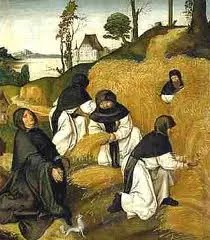The dangers were both foreign and domestic. Raids from Vikings were a constant disruption of monastic life: destroying holy relics, burning crops, pillaging goods, impoverishing the abbeys so that they had to turn to nobles for financial support.
Dependence on local nobles—rather than being self-sufficient, which was the original intent—led to awkward circumstances. A lord might exert undue influence over the land used by the abbey, or the abbey itself. A nobleman might expect that a relative would be installed in the privileged position of abbot or abbess. A noble might also assume control over the abbey's revenue.
Daily life could be disrupted by a non-dedicated abbot, or simply by having a nobleman retire there, which was sometimes the case. He might demand a change in the schedule so that Matins, for instance, would not take place in the middle of the night, as it was designed. The strict vegetarian diet might be expanded to include meat, fasting and silence and monks' robes could be foregone for a much more comfortable daily life.
Ironically, given the last paragraph, it was a nobleman who created the situation that would return monastic living to its Benedictine ideal. That was the Duke of Aquitaine, and the founding of Cluny Abbey, which I will tell you about tomorrow.

No comments:
Post a Comment
Note: Only a member of this blog may post a comment.